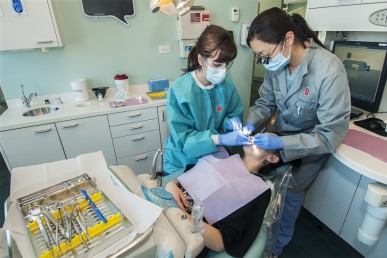Technology, other amenities attract future dentists
Daniel Rosales thought a career as a physician was in his future, but a trip to Panama led him to a different kind of medicine — oral medicine.
A fourth-year dental student at the University of Illinois at Chicago who will graduate in May, Rosales is entering one of America’s fastest growing fields. The Bureau of Labor Statistics predicts by 2024 dentistry will have grown 18 percent in a decade, and U.S. News & World Report recently named it the number-one field to enter.
Dentistry is an attractive profession for many reasons — flexible schedule, low unemployment, great work-life balance, and good salary, just to name a few, says Dr. Clark Stanford, dean of the UIC College of Dentistry.
“There are many more choices in how dentists practice today,” Stanford said. In the past, it was common for a dentist to open a small solo practice, but the trend today is toward group practices. With costs of practice rising — for equipment, staff and supplies — many dentists are finding group practice a more financially viable option.
Dental support organizations are also gaining in popularity, Stanford said. Known by some as “corporate dentistry,” dental service organizations contract with practices to provide business management and support for non-clinical operations. DSOs allow dentists to concentrate solely on their patients’ health, Stanford said.
Historically dominated by men, the dental profession now sees women comprising 19 percent of the U.S. workforce. That figure, according to the American Dental Association, is expected to rise to 28 percent by 2020.
Job flexibility is one reason why more women are entering the oral healthcare workforce, Stanford said.
“There are so many more opportunities today for women than when I went to school in the 1980s,” he said. “Dentists can leave their practice to start a family and then return when they like. Or they can work part-time. It’s not like you’re running a company and sitting at a desk five days a week. You can practice two days a week and raise your family three days a week. The flexibility is seen as an attribute today.”
Dentists are also compensated well, sometimes earning more than physicians, Stanford said. Money, however, should not enter into a person’s decision to choose one profession over the other, he said. But other factors might.
“In dentistry, you have all the benefits and rewards of working with patients as physicians do, but often times you get to know them better because you see them more often,” he said. “Physicians normally don’t have that kind of one-on-one interaction with patients.”
Stanford noted the rewards may be seen sooner for a dentist as well.
“We work with the patients to understand what their needs are and then develop a treatment plan,” he said. “We take a possible bad situation, perform the therapies they need, and then they can see how much better their smile looks now. A beautiful smile is a concrete outcome that both the dentist and patient can see.”
Rapidly evolving technology is also intriguing to students, Stanford said. The dental industry is being revolutionized today by advances in digital dentistry that often allow professionals to work more efficiently; new materials that help the tooth become stronger; and 3-D printers that can turn models into solid objects.
UIC students are ably prepared for community dentistry. Every fourth-year student is required to spend 16 weeks an off-site practice. Many are in Chicago, but others are in northern Illinois and some are international — Guatemala and Tanzania. Some sites predominantly treat HIV patients, while others specialize in pediatrics or special needs, geriatrics, or the homeless.
“Going out into the community helps teach our students cultural competency and provides them with an opportunity to learn about social justice and health equity issues,” Stanford said. “It gives our students a broader understanding of their responsibility as being a member of a privileged workforce, which it is. It’s a privilege being able to help other people.”
Rosales, the UIC fourth-year student, has always enjoyed helping people. Prior to starting his undergraduate studies at Loyola University of Chicago, he was interested in becoming a physician. But after shadowing several doctors and learning the length of education it took to enter the field, he didn’t see medicine as a viable goal. He volunteered on a medical mission to Panama, where he was exposed to dentistry. He returned home with a new career path.
“In Panama, I saw a lot of people in need,” Rosales, said. “I began volunteering at a dental clinic, and I saw the same thing in Chicago as I did in Panama. I enjoy helping people and philanthropy. I felt dentistry was a good fit for me, and so far it has been.”
While dentistry offers several specialty areas — orthodontics, periodontics, oral and maxillofacial surgery, among others — Rosales is interested in general dentistry. He hopes to one day open his own practice.
“I just performed a root canal on a patient, and I know I helped reduce his pain,” Rosales said. “It’s extremely satisfying to know I help people with their oral health. I’ve never enjoyed anything like I have dentistry. I’m ecstatic that I chose the field.”
